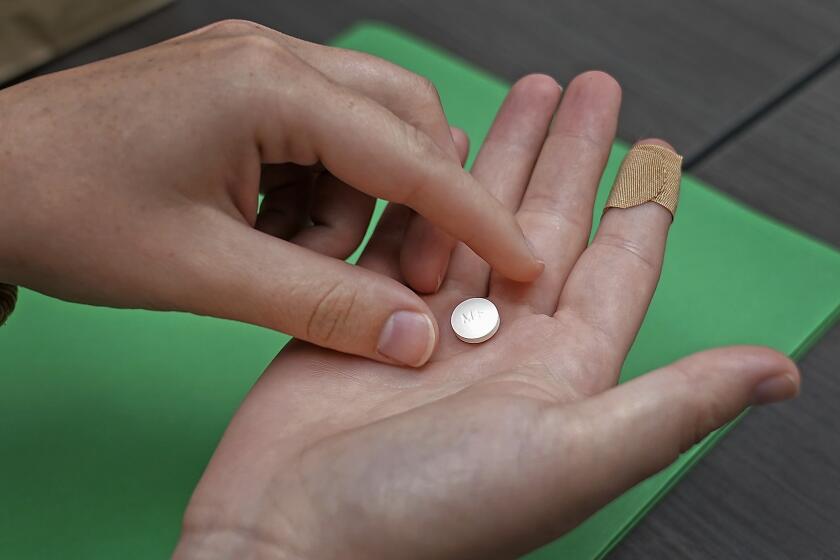California asks FDA to undo limits on abortion pill mifepristone amid RFK Jr. scrutiny

- Share via
- California joined Massachusetts, New York and New Jersey in asking the FDA to ease restrictions on the abortion pill, or exempt them from those restrictions.
- Health and Human Services Secretary Robert F. Kennedy Jr. has cited dubious data pushed by antiabortion activists to claim restrictions are needed on the medication.
California and three other states petitioned the U.S. Food and Drug Administration on Thursday to ease its restrictions on the abortion pill mifepristone, citing the drug’s proven safety record and arguing the limits are unnecessary.
“The medication is a lifeline for millions of women who need access to time-sensitive, critical healthcare — especially low-income women and those who live in rural and underserved areas,” said California Atty. Gen. Rob Bonta, who filed the petition alongside the attorneys general of Massachusetts, New York and New Jersey.
The petition cites Senate testimony by Health and Human Services Secretary Robert F. Kennedy Jr. last month, in which Kennedy said he had ordered FDA administrator Martin Makary to conduct a “complete review” of mifepristone and its labeling requirements.
The drug, which can be received by mail, has been on the U.S. market for 25 years and taken safely by millions of Americans, according to experts. It is the most common method of terminating a pregnancy in the U.S., with its use surging after the Supreme Court overturned Roe vs. Wade in 2022.
The Supreme Court upheld access to the drug for early pregnancies under previous FDA regulations last year, but it has remained a target of antiabortion conservatives. The Trump administration has given Kennedy broad leeway to shake up American medicine under his “Make America Healthy Again” banner, and Kennedy has swiftly rankled medical experts by using dubious science — and even fake citations — to question vaccine regimens and research and other longstanding public health measures.
Hiltzik: MAHA report’s misrepresentations will harm public health and hit consumers’ pocketbooks
RFK Jr.’s ‘Make America Healthy Again’ report was an AI-generated embarrassment, but even the non-AI parts were lies and misrepresentations.
At the Senate hearing, Kennedy cited “new data” from a flawed report pushed by antiabortion groups — and not published in any peer-reviewed journal — to question the safety of mifepristone, calling the report “alarming.”
“Clearly, it indicates that, at very least, the label should be changed,” Kennedy said.
Sen. Josh Hawley (R-Mo.) on Monday posted a letter from Makary to X, in which Makary wrote that he was “committed to conducting a review of mifepristone” alongside “the professional career scientists” at the FDA.
Makary said he could not provide additional information given ongoing litigation around the drug.
The states, in their 54-page petition, wrote that “no new scientific data has emerged since the FDA’s last regulatory actions that would alter the conclusion that mifepristone remains exceptionally safe and effective,” and that studies “that have frequently been cited to undermine mifepristone’s extensive safety record have been widely criticized, retracted, or both.”
Democrats have derided Kennedy’s criticisms of mifepristone as politically motivated and baseless.
“This is yet another attack on women’s reproductive freedom and scientifically-reviewed health care,” Gov. Gavin Newsom said the day after Kennedy’s Senate testimony. “California will continue to protect every person’s right to make their own medical decisions and help ensure that mifepristone is available to those who need it.”
Bonta said Thursday that mifepristone’s placement under the FDA’s Risk Evaluation and Mitigation Strategy program for drugs with known, serious side effects was “medically unjustified,” unduly burdened patient access and placed “undue strain on the nation’s entire health system.”
He said mifepristone “allows people to get reproductive care as early as possible when it is safest, least expensive, and least invasive,” is “so safe that it presents lower risks of serious complications than taking Tylenol,” and that its long safety record “is backed by science and cannot be erased at the whim of the Trump Administration.”
Mifepristone has been used more than 5 million times in the U.S. since its FDA approval in 2000. The Supreme Court will weigh a challenge to expanding its access.
The FDA has previously said that fewer than 0.5% of women who take the drug experience “serious adverse reactions,” and deaths are exceedingly rare.
The risk evaluation program requires prescribers to add their names to national and local abortion provider lists, which can be a deterrent for doctors given safety threats, and pharmacies to comply with complex tracking, shipping and reporting requirements, which can be a deterrent to carrying the drug, Bonta said.
It also requires patients to sign forms in which they attest to wanting to “end [their] pregnancy,” which Bonta said can be a deterrent for women using the drug after a miscarriage — one of its common uses — or for those in states pursuing criminal penalties for women seeking certain abortion care.
Under federal law, the requirements must address a specific risk posed by a drug and cannot be “unduly burdensome” on patients, and the application to mifepristone “fails to meet that standard,” Bonta said.
The states’ petition is not a lawsuit, but a regulatory request for the FDA to reverse course, the states said.
If the FDA will not do so nationwide, the four petitioning states asked that it “exercise its discretion to not enforce the requirements” in their states, which Bonta’s office said already have “robust state laws that ensure safe prescribing, rigorous informed consent, and professional accountability.”
More to Read
Get the L.A. Times Politics newsletter
Deeply reported insights into legislation, politics and policy from Sacramento, Washington and beyond. In your inbox twice per week.
You may occasionally receive promotional content from the Los Angeles Times.













